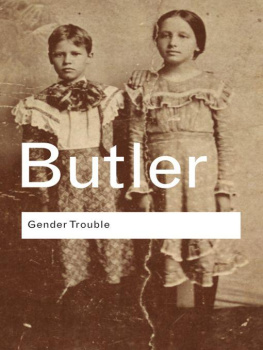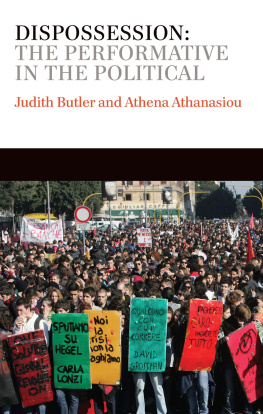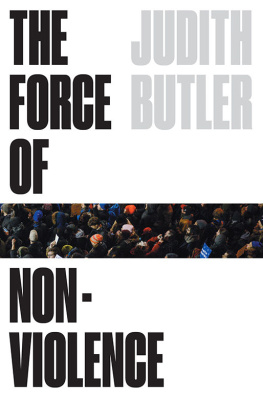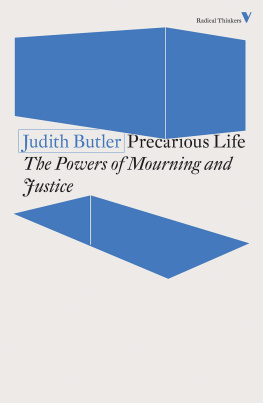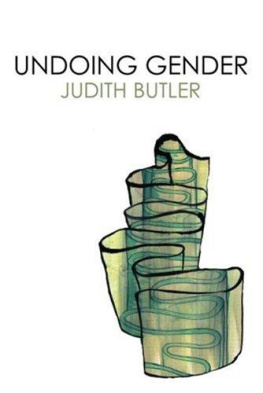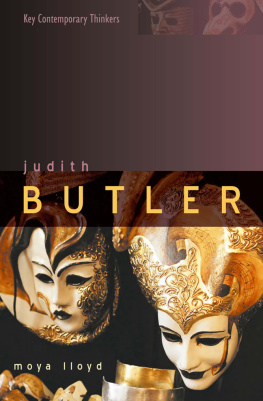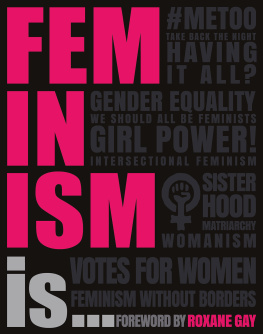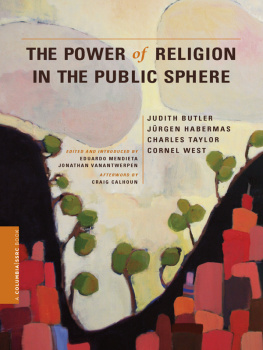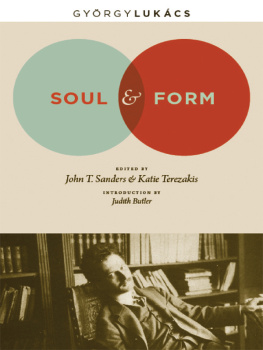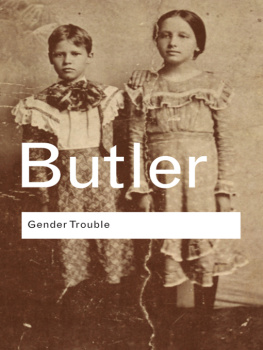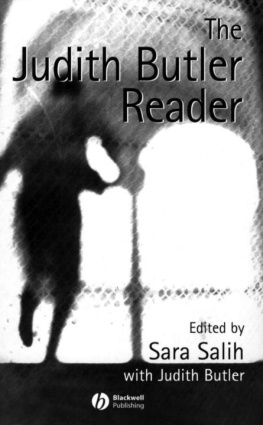Judith Butler - Gender Trouble: Feminism and the Subversion of Identity (Routledge Classics Edition)
Here you can read online Judith Butler - Gender Trouble: Feminism and the Subversion of Identity (Routledge Classics Edition) full text of the book (entire story) in english for free. Download pdf and epub, get meaning, cover and reviews about this ebook. year: 2006, publisher: Routledge, genre: Science. Description of the work, (preface) as well as reviews are available. Best literature library LitArk.com created for fans of good reading and offers a wide selection of genres:
Romance novel
Science fiction
Adventure
Detective
Science
History
Home and family
Prose
Art
Politics
Computer
Non-fiction
Religion
Business
Children
Humor
Choose a favorite category and find really read worthwhile books. Enjoy immersion in the world of imagination, feel the emotions of the characters or learn something new for yourself, make an fascinating discovery.
- Book:Gender Trouble: Feminism and the Subversion of Identity (Routledge Classics Edition)
- Author:
- Publisher:Routledge
- Genre:
- Year:2006
- Rating:3 / 5
- Favourites:Add to favourites
- Your mark:
- 60
- 1
- 2
- 3
- 4
- 5
Gender Trouble: Feminism and the Subversion of Identity (Routledge Classics Edition): summary, description and annotation
We offer to read an annotation, description, summary or preface (depends on what the author of the book "Gender Trouble: Feminism and the Subversion of Identity (Routledge Classics Edition)" wrote himself). If you haven't found the necessary information about the book — write in the comments, we will try to find it.
Judith Butler: author's other books
Who wrote Gender Trouble: Feminism and the Subversion of Identity (Routledge Classics Edition)? Find out the surname, the name of the author of the book and a list of all author's works by series.
Gender Trouble: Feminism and the Subversion of Identity (Routledge Classics Edition) — read online for free the complete book (whole text) full work
Below is the text of the book, divided by pages. System saving the place of the last page read, allows you to conveniently read the book "Gender Trouble: Feminism and the Subversion of Identity (Routledge Classics Edition)" online for free, without having to search again every time where you left off. Put a bookmark, and you can go to the page where you finished reading at any time.
Font size:
Interval:
Bookmark:

Gender Trouble is a classic in the best sense: rereading this book, as well as reading it for the first time, reshapes the categories through which we experience and perform our lives and bodies. To be troubled in this way is an intellectual pleasure and a political necessity. Butlers lucid, witty and very smart classic is more than critique of gender-making apparatuses; it is generative of possibilities for promising monsters who may yet reconfigure what can count as natural.
Donna Haraway
The most authoritative attack to date on the naturalness of gender. This is a brilliant and innovative book.
Sandra Lee Bartky
Indispensable for feminist theory.
Hypatia
At times brilliant, always groundbreaking, Gender Trouble is bound to make some trouble of its own.
Outweek
A tremendously sophisticated and well-argued book, a very exciting read.
Women and Politics

Routledge Classics contains the very best of Routledge publishing over the past century or so, books that have, by popular consent, become established as classics in their field. Drawing on a fantastic heritage of innovative writing published by Routledge and its associated imprints, this series makes available in attractive, affordable form some of the most important works of modern times.
For a complete list of titles visit
www.routledge.com/classics

| 1 |
| I |
| II |
| III |
| IV |
| V |
| VI |
| 2 |
| I |
| II |
| III |
| IV |
| V |
| 3 |
| I |
| II |
| III |
| IV |
Ten years ago I completed the manuscript of Gender Trouble and sent it to Routledge for publication. I did not know that the text would have as wide an audience as it has had, nor did I know that it would constitute a provocative intervention in feminist theory or be cited as one of the founding texts of queer theory. The life of the text has exceeded my intentions, and that is surely in part the result of the changing context of its reception. As I wrote it, I understood myself to be in an embattled and oppositional relation to certain forms of feminism, even as I understood the text to be part of feminism itself. I was writing in the tradition of immanent critique that seeks to provoke critical examination of the basic vocabulary of the movement of thought to which it belongs. There was and remains warrant for such a mode of criticism and to distinguish between self-criticism that promises a more democratic and inclusive life for the movement and criticism that seeks to undermine it altogether. Of course, it is always possible to misread the former as the latter, but I would hope that that will not be done in the case of Gender Trouble .
In 1989 I was most concerned to criticize a pervasive heterosexual assumption in feminist literary theory. I sought to counter those views that made presumptions about the limits and propriety of gender and restricted the meaning of gender to received notions of masculinity and femininity. It was and remains my view that any feminist theory that restricts the meaning of gender in the presuppositions of its own practice sets up exclusionary gender norms within feminism, often with homophobic consequences. It seemed to me, and continues to seem, that feminism ought to be careful not to idealize certain expressions of gender that, in turn, produce new forms of hierarchy and exclusion. In particular, I opposed those regimes of truth that stipulated that certain kinds of gendered expressions were found to be false or derivative, and others, true and original. The point was not to prescribe a new gendered way of life that might then serve as a model for readers of the text. Rather, the aim of the text was to open up the field of possibility for gender without dictating which kinds of possibilities ought to be realized. One might wonder what use opening up possibilities finally is, but no one who has understood what it is to live in the social world as what is impossible, illegible, unrealizable, unreal, and illegitimate is likely to pose that question.
Gender Trouble sought to uncover the ways in which the very thinking of what is possible in gendered life is foreclosed by certain habitual and violent presumptions. The text also sought to undermine any and all efforts to wield a discourse of truth to delegitimate minority gendered and sexual practices. This doesnt mean that all minority practices are to be condoned or celebrated, but it does mean that we ought to be able to think them before we come to any kinds of conclusions about them. What worried me most were the ways that the panic in the face of such practices rendered them unthinkable. Is the breakdown of gender binaries, for instance, so monstrous, so frightening, that it must be held to be definitionally impossible and heuristically precluded from any effort to think gender?
Some of these kinds of presumptions were found in what was called French Feminism at the time, and they enjoyed great popularity among literary scholars and some social theorists. Even as I opposed what I took to be the heterosexism at the core of sexual difference fundamentalism, I also drew from French poststructuralism to make my points. My work in Gender Trouble turned out to be one of cultural translation. Poststructuralist theory was brought to bear on U.S. theories of gender and the political predicaments of feminism. If in some of its guises, poststructuralism appears as a formalism, aloof from questions of social context and political aim, that has not been the case with its more recent American appropriations. Indeed, my point was not to apply poststructuralism to feminism, but to subject those theories to a specifically feminist reformulation. Whereas some defenders of poststructuralist formalism express dismay at the avowedly thematic orientation it receives in works such as Gender Trouble , the critiques of poststructuralism within the cultural Left have expressed strong skepticism toward the claim that anything politically progressive can come of its premises. In both accounts, however, poststructuralism is considered something unified, pure, and monolithic. In recent years, however, that theory, or set of theories, has migrated into gender and sexuality studies, postcolonial and race studies. It has lost the formalism of its earlier instance and acquired a new and transplanted life in the domain of cultural theory. There are continuing debates about whether my own work or the work of Homi Bhabha, Gayatri Chakravorty Spival, or Slavoj iek belongs to cultural studies or critical theory, but perhaps such questions simply show that the strong distinction between the two enterprises has broken down. There will be theorists who claim that all of the above belong to cultural studies, and there will be cultural studies practitioners who define themselves against all manner of theory (although not, significantly, Stuart Hall, one of the founders of cultural studies in Britain). But both sides of the debate sometimes miss the point that the face of theory has changed precisely through its cultural appropriations. There is a new venue for theory, necessarily impure, where it emerges in and as the very event of cultural translation. This is not the displacement of theory by historicism, nor a simple historicization of theory that exposes the contingent limits of its more generalizable claims. It is, rather, the emergence of theory at the site where cultural horizons meet, where the demand for translation is acute and its promise of success, uncertain.
Font size:
Interval:
Bookmark:
Similar books «Gender Trouble: Feminism and the Subversion of Identity (Routledge Classics Edition)»
Look at similar books to Gender Trouble: Feminism and the Subversion of Identity (Routledge Classics Edition). We have selected literature similar in name and meaning in the hope of providing readers with more options to find new, interesting, not yet read works.
Discussion, reviews of the book Gender Trouble: Feminism and the Subversion of Identity (Routledge Classics Edition) and just readers' own opinions. Leave your comments, write what you think about the work, its meaning or the main characters. Specify what exactly you liked and what you didn't like, and why you think so.

